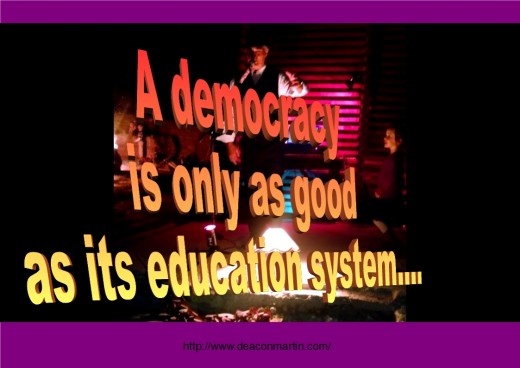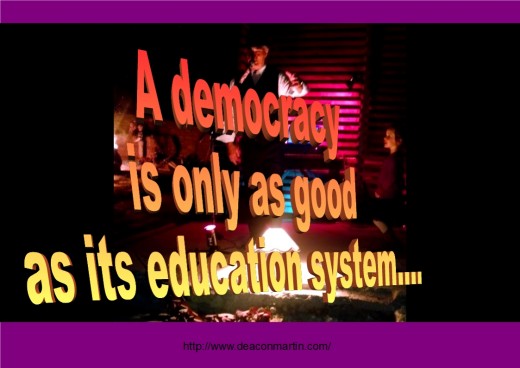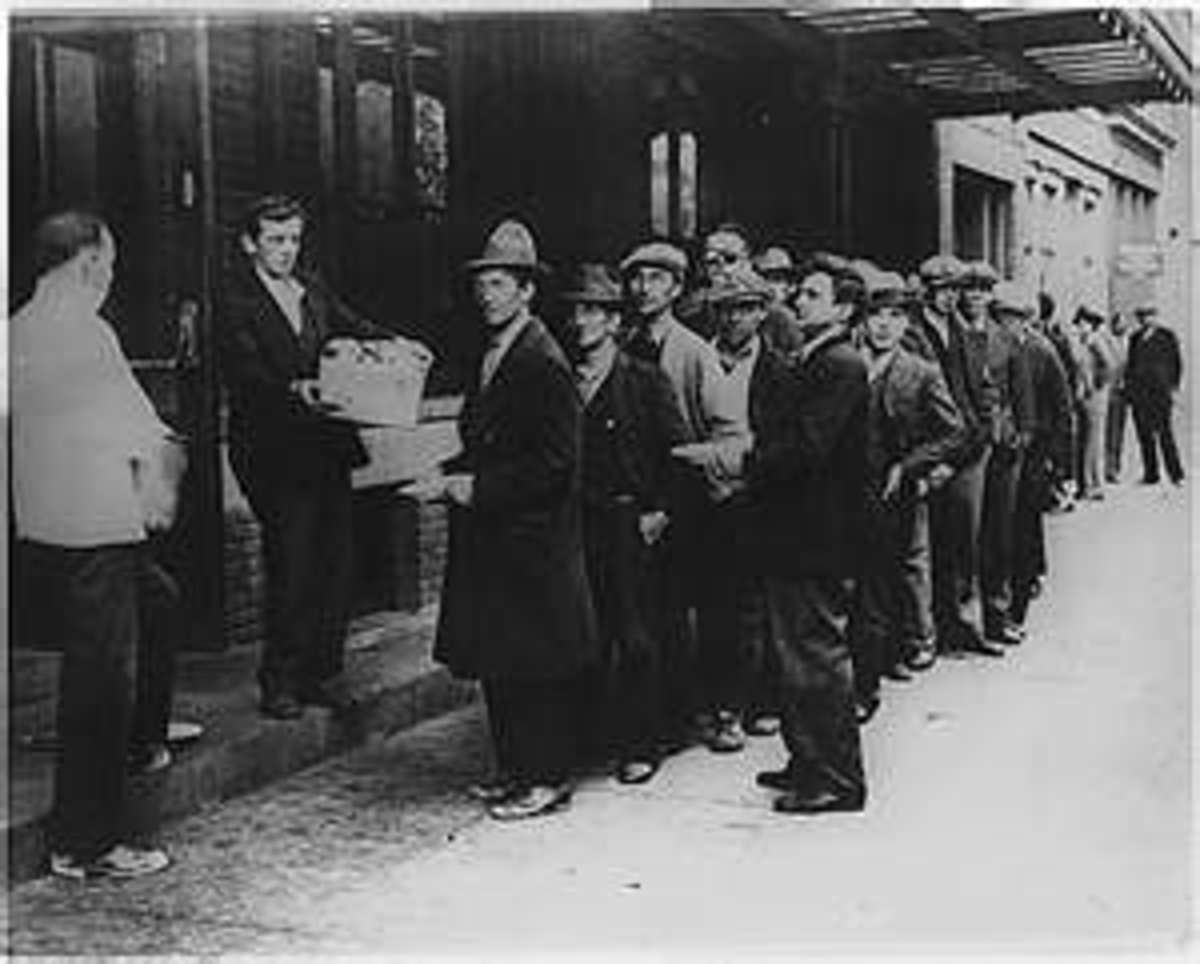Guidance for Government - Education

Part 2 of 4 - Education
A Democracy is only as good as its Education System
Every year thousands upon thousands of secondary school leavers are released into the society for which they have, supposedly, been being prepared. It is more and more widely recognised that:
- these people have not enjoyed their final years in the secondary system and are anxious to leave, and
- this process, to which they have been more or less unwillingly subjected, has not even had the saving grace of succeeding in this supposed preparation.
Many of these people have come from schools where "discipline", still the cornerstone of current educational method, has been breaking down. Classrooms have been chaotic and learning has been an almost incidental by-product. Many educationalists have been turning a blind eye to all this and have carried on developing theory which is totally divorced from the practical, day to day reality.
The consequential impact of this production line of disenchantment has been disastrous in ways too numerous to list. In fact, the impact has been so broad, so pervasive, so much a part of our every day lives that, for all practical purposes, it goes unnoticed. Escalating violence in the streets and homes.... Escalating stupidity and insensitivity in the forces of "law and order".... Escalating attitudes of rabid self-interest among the better-off.... And, above all, the rising torpor of large sections of the population who sense that they are under attack but lack the analytical and organisational wherewithal to respond.... These are all symptoms of a much larger malaise.
What is this larger malaise? Where is it coming from?
Many would argue that the malaise arises out of the obscenely unequal distribution of goods, resources, and services. This is certainly a large and fundamental part of it, but experience has shown, time and time again, that people with adequate access to goods, resources, and services don't necessarily develop attitudes of concern and commitment to making these same things available to everyone else. Material well being doesn’t in itself generate a concern for society and the success of democracy.
Many would argue that this malaise arises out of the obscenely unequal distribution of power and justice. This too is very much and very fundamentally a part of the problem. But the same argument applies. Those already in receipt of satisfactory quantities of justice and power show little or no sign of using these to the general benefit of all those without. Legal and economic well being doesn't in itself generate a concern for society and the success of democracy.
Why not? Who cares, but the fact remains that they do not. More to the point, why aren't the people without material, legal, or economic well being creating hell to rectify this unsupportable situation?
To me the answer is glaringly and embarrassingly obvious. The production line of disenchantment is the main shaper of attitudes in this society. All the other distortions of information produced by distributive inequalities and nonsensical communications media serve to reinforce, hone, and refine these attitudes, but the foundations are all but irrevocably laid in the primary and secondary education systems.
Our citizens are created in the education system.
Participative citizenship is, at best, a laughing stock. At its worst, it is non-existent. Where it does exist, it usually receives hysterical media condemnation as being the product of some "vocal minority" or other. What most people in this country assume to be taking place in the way of democratic process is a gross exaggeration of reality.
In the work place, poor communication between shop floor and management creates expensive and time consuming multiplications of initially small, manageable problems. Because the hierarchically authoritarian model of the education system is, for the most part, reflected in the workplace, there is virtually no upward flow of information (something upon which nearly every visiting Scandinavian, German or Japanese business person comments).
The cumulative message, first from the from the education system and then from the workplace, is "...do as you're told; don't ask questions." The absence of critical thought abounds. The proliferation of unsuccessful models of educational and work administration continues. They continue because people, themselves products of and participants in hierarchical authoritarian systems, tend to say of the processes that their children are experiencing, "What was and is good enough for us, is good enough for our children....". And those of us who managed (primarily by force of economic circumstance) to survive the process with some sensitivity and some critical faculty still intact seem unwilling or unable to make a concerted effort to precipitate change.
History is littered with isolated examples of attempts to contravene this educational process and its after effects. Many individual teachers and even entire schools have experimented with giving students a real say in the formulation of their own education. Many experimental initiatives have been taken to allow students to determine fully their courses of action within specific areas of study. Many schools, now and in the past, have successfully incorporated genuine student representation into the very management of their institution. But these isolated examples die out and are forgotten and, ultimately, have shown no sign of bearing influence on national educational policy making.
The main reason these experiments have died out, unnoticed, is that there has been no political will to provide the legislation to support and protect these initiatives.
What does this tell us about idealistic experimentation in the absence of political will? By and large it tells us that there have been a lot of good, committed, creative people who have devoted substantial parts of their lives to the betterment of educational practices, but whose efforts have amounted to naught because there has been no consistent interest in following up their initiatives. What's worse is that the absolute contrary seems to have been the case - that these committed and creative people have been induced into nowhere sidings where they could be contained and ignored at one and the same time. More sinisterly, it could be argued that there seems to have been a conscious policy in force - a policy which protects the education system from innovation whilst, concurrently, purveying an image of liberal, concerned, and forgiving interest.
So how does one break this destructive cycle. What strategies suggest themselves to us?
To my simple mind, the answer is gratingly obvious. What's called for is clear legislation for the democratisation of schools.
This simplistic (to some) but frightening (to others) conclusion has a number of in-built features which, one would think, might appeal to believers in the democratic system. A sensible, co-ordinated period of introduction could serve to popularise practical democracy among the public at large. Democratic processes are often portrayed as tedious, time-consuming, and of use only to careerist politicians - but they needn't be. Many of us know that collective decision making can be very dramatic and involving; even uplifting. General public enthusiasm for such procedures should, one might suppose, be welcomed by committed democrats.
But in the education system itself, a carefully introduced programme could harness much of the disaffected energy of the "misfits" of today to the benefit of systematic, orderly, and ongoing experimentation which, in responding to the needs of all the participants, could only serve to make of education the popular resource we so desperately require. And that very process of democratically evolved education would, even if the actual "transfer of knowledge" itself could be shown to be inadequate (could it possibly be less adequate than now?), produce generations of citizens fully versed and fluent in the practices and techniques of democratic procedure. They would have a very real, firsthand grasp of the pleasures and pitfalls of collective authority and collective responsibility. Would they, ever again, settle for a non-participative role in the administration of their lives? Would we, as campaigners for social justice in a thousand and one different ways, ever again come across the stunning ignorance and listless lack of interest we, at present, face in such discouraging quantities every day?
What's called for
What's called for is legislation providing for the equal representation of
- students,
- teaching & non-teaching staff, and
- parents & local community
on the Governing Boards of every secondary school.
This legislation should re-affirm the authority of these bodies in the running of their schools. There must be, associated with these provisions, schemes for the familiarisation of all concerned, particularly students and members of the local community in need of "positive discrimination" in these respects, with the fundamentals of democratic process and how to make genuine, practical use of them. All Governing Bodies would be linked through regional and national elective assemblies with the national assembly becoming the major educational policy maker. The whole process would probably require a carefully planned and staggered introduction, perhaps year by year and/or region by region.
We are talking about pressing for legislation (5, 10, 15 years?) for a scheme which will take six to ten years to implement. By current standards this is long term planning in the extreme, but can we afford to ignore the current reality of an education system spewing out disenchantment on a scale which ridicules every effort at reform?
As we struggle to take responsibility for what we have been and continue to do to the planet as a whole, can we afford to overlook the contribution of our educative systems to the process of allowing corporate economic tyranny to prevail over democracy?

See also....
© 2010 Deacon Martin








